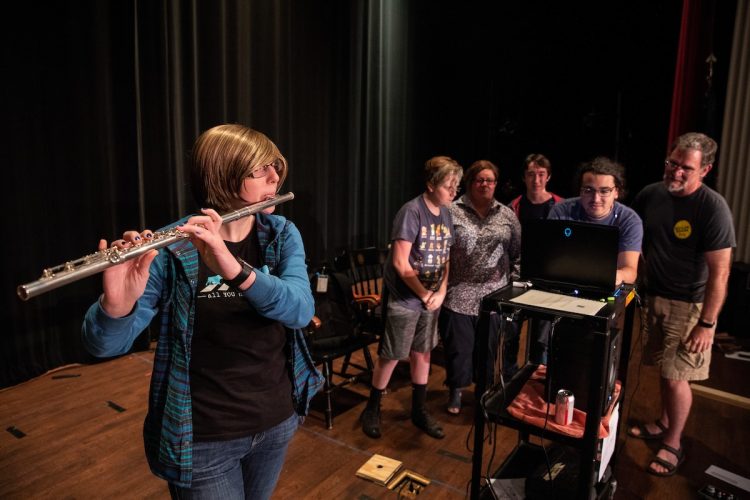Sound check: Summer Research examines natural, acoustic properties of Randolph performance venues

Hailey Gilman plays flute while the rest of the group watches the audio frequency levels
In 1969, American composer Alvin Lucier recorded a monologue called “I Am Sitting in a Room” and played the audio from a speaker into a microphone multiple times at various distances and frequencies. Eventually, after multiple iterations, all that was left to be heard were the high-pitched, natural, resonant overtones of the room.
“It sounds sort of alien, and sort of like a bunch of wine glasses being played,” said music professor Randall Speer. “He actually stopped the piece when he felt like he had the most musical quality and when he considered it a musical performance.”
For Summer Research, Speer and Katrin Schenk, a physics professor are working with Joe Vazquez ’20 and Hailey Gilman ’21 to replicate Lucier’s experiment to see if it provides an accurate measurement of acoustics and natural resonant properties in Randolph’s performance spaces. Among the places they have recorded are Wimberly Recital Hall and the music practice rooms in Presser Hall, Smith Hall Theatre, Nichols Theatre, and Houston Memorial Chapel. They have tested several sounds so far, including spoken voice, singing, a slapstick, and flute. They have also picked up several unanticipated sounds like chirping birds, lawnmowers, and tire screeches and blaring vehicle horns from nearby Rivermont Avenue.
“Basically what we’re doing is creating something called ‘pink noise,’ which sounds fairly even across the frequency spectrum and is somewhat similar to white noise,” Speer explained. “We’ve had surprisingly more consistent results than we anticipated and have gotten to see how these rooms are each tuned to certain pitches.”
As the group creates recordings, they are also measuring the acoustic properties in each room, which is where Schenk and the physics side of the project come in.
“We’re analyzing the sounds to try and figure out what is actually happening and what frequencies are coming up in these amplified recordings compared to the original frequencies of the sounds they’re putting in,” Schenk said. “We’re also trying to figure out if there are any other factors that could be interfering or influencing the sound, and trying to understand what we’re getting.”
Vazquez and Gilman are both physics majors and music minors, and they are highly involved in both programs at Randolph. Vazquez is known on campus for his vocal performances, and Gilman for her skills on the flute.
“Physics and music have been a big part of our lives for years, and getting to combine them in this way is really amazing,” Vazquez said. “Hopefully we will be able to publish what we find.”
“This is also helpful as we consider grad school and the careers we want to go into,” Gilman added. “Acoustics is definitely a nice marriage between music and physics.”
Tags: Hailey Gilman, Joe Vazquez, Katrin Schenk, music, performing arts, physics, quotables-music, quotables-physics, randall speer, summer research, summer research 2019
